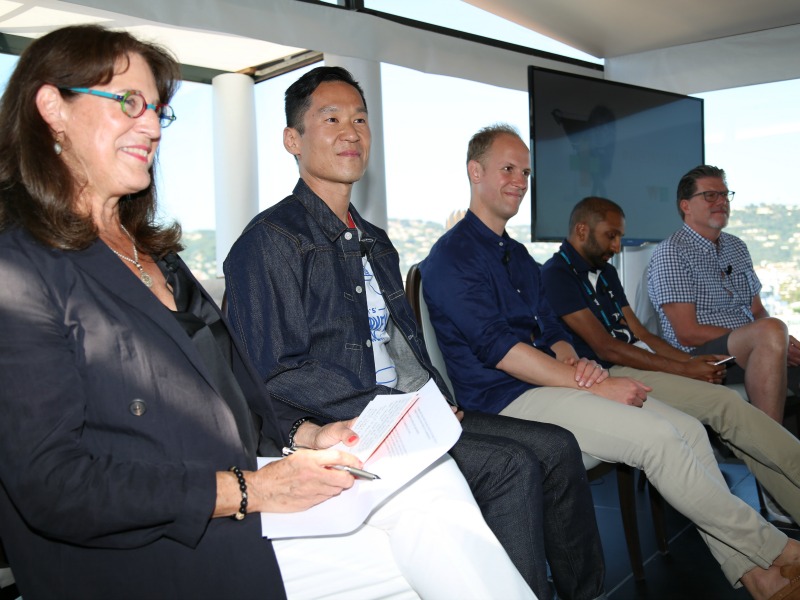Paul Holmes 27 Jun 2016 // 11:54AM GMT

CANNES—Innovative technologies can help companies expand and refine their social purpose initiatives, moving beyond words to action, according to We Cannes Do, an event hosted by WE Communications and The Holmes Report at Cannes last week.
In a rousing introduction, WE chief executive Melissa Waggener-Zorkin called on those in attendance to “move from talking to doing” when it comes to social purpose. “I believe creativity and innovation most powerful when they move people to action,” she said, introducing the new We Can Do awars, which will find people around the world who “find people who know how to tell stories and use creativity for social good and bring them back here in 12 months to compare their work with other work we see here.”
The ensuing panel discussion featured companies that are already using creativity and innovation to advance social causes, including Unilever, whose “Real Women” and “Project Sunlight” campaigns were among those cited by the audience when asked to identify examples of creative social purpose work.
Jeremy Basset, head of Unilever Foundry (a global platform for collaborating with innovative startups) told the audience: “There’s a huge opportunity to bring innovation to life through technology. Our best performing brands have very deep social purpose and we spend a lot of time thinking about what is the big issue for our brand and how we bring that to life through communications—and our job is to think about how we can enhance that through technology.”
For example, he said, Unilever has “used tech to intercept tweets that had a negative message around beauty and turning them around” and has supported a startup developing smart monitoring technology that can alert people in real-time when fresh water is available in their area—a huge boon for people who can wait hours for fresh water.
Brian Lott, head of group communications for Mubadala in Abu Dhabi, described his company’s efforts to use creative storytelling techniques to address the culture change going on this Middle East.
“Abu Dhabi is going through massive shifts, economic because of the price of oil and demographic changes, and you now have a generation looking for employment at a time when government jobs are pretty much capped and we are trying to attract those people to the private sector. A lot of our communications is aimed at those individuals, but also at parents to tell them it is okay for them to work in a semiconductor factory, for example. We have to tell those stories in a creative way to break down the cultural barriers.”
At Levi Strauss & Co., meanwhile, the focus on social purpose goes back to the company’s origins in 1853, and is currently spearheaded by Daniel Lee, executive director of the Levi Strauss Foundation, who added: “It’s important to talk about what it takes to really improve people’s lives. People in the CSR arena are focusing on what their work means to people in a community. Does it go deep, or will it make a difference over a period of time.”
That will help to overcome some of the continuing skepticism over CSR, which is still regarded with suspicion by many NGOs and ordinary citizens, according to The Holmes Report’s Arun Sudhaman.
“I think media coverage of social initiatives can be fairly cynical and so there is a tendency to doubt the motives of big organizations,” Sudhaman said. “Walking around Cannes, a lot of the award-winning work is cause-driven and you wonder whether it’s being used as a tactic to win awards. But I think coverage has turned because of social media and citizen journalists.”
Basset agrees that “there’s huge skepticism around social purpose.” Much of that skepticism comes from the corporate world and the investment community, as well as from NGOs, but he believes Unilever has been making the business case. “This is something we have been doing since the company was conceived 130 years ago, and we find there is a very strong business case for this. The brands that really put sustainability at the center are growing 30 percent faster than the rest of our portfolio. The work really resonates with consumers.”
Even so, true social purpose can appear risky.
“It takes courage,” says Lee. “We are seeing in the wake of marriage equality ruling in the US a rise in hate crimes against the LGBT community and particularly against those who are most vulnerable and marginalized. And we are seeing a backlash in terms of 200 bills that are anti-LGBT.
“It’s remarkable to see the force of the business community in places like North Carolina and Georgia and it’s there where business has power. You have companies threatening to cancel their expansion there or withdraw their business from the state. It’s fascinating to me—I would never have seen myself on the side of business but more and more we are seeing them standing up.”
Photo, left to right: Melissa Waggener-Zorkin, Daniel Lee, Jeremy Basset, Arun Sudhaman, Brian Lott.


































.jpg)

















